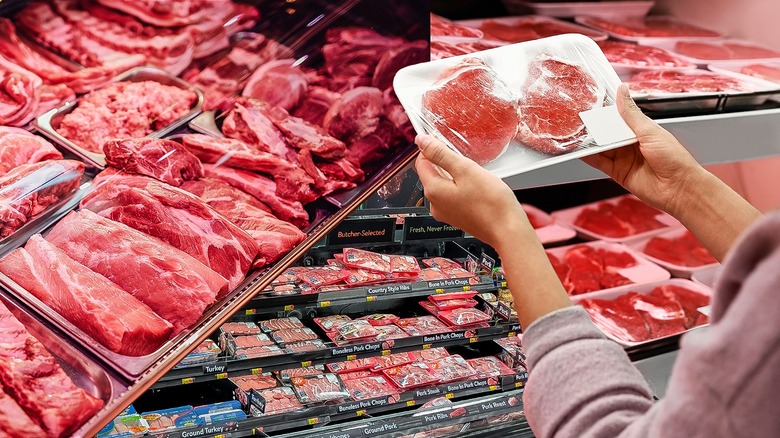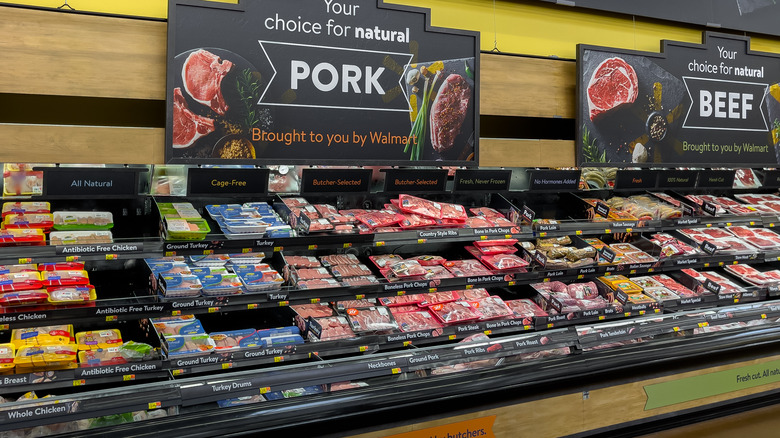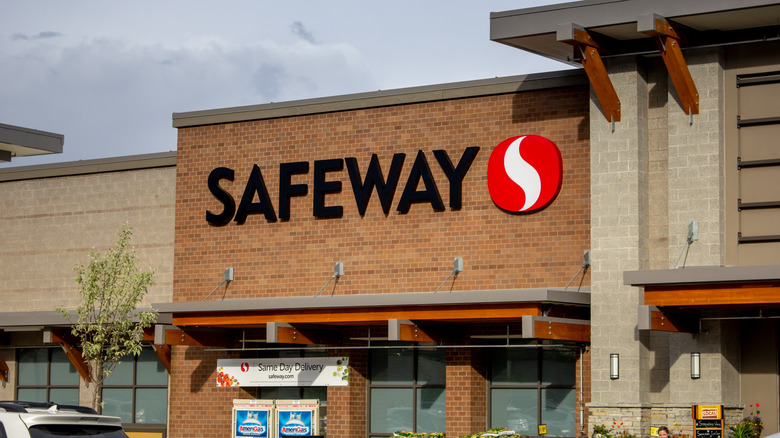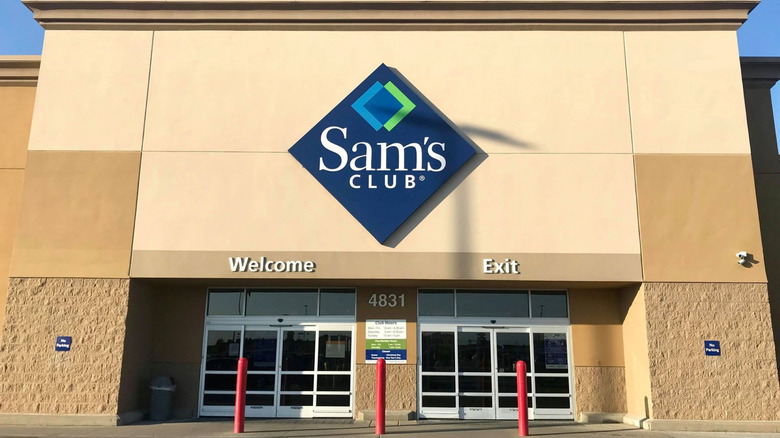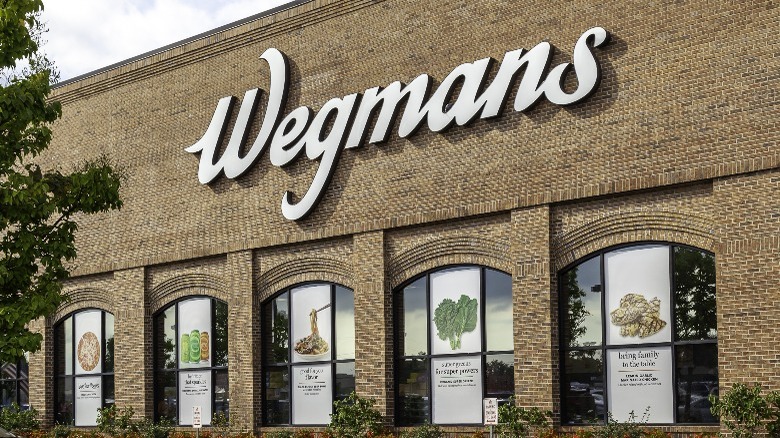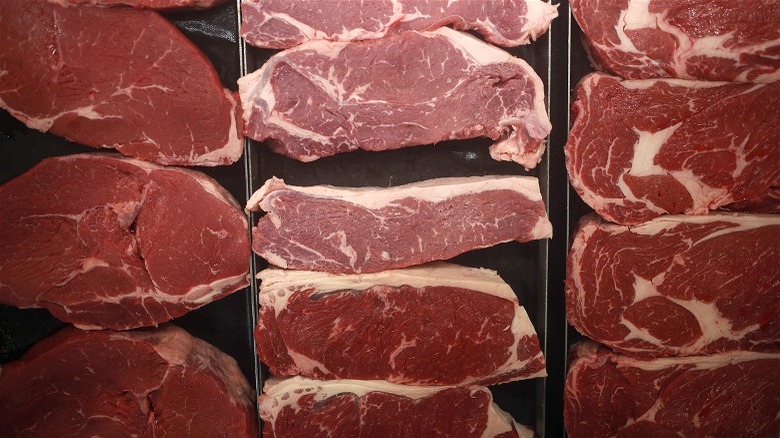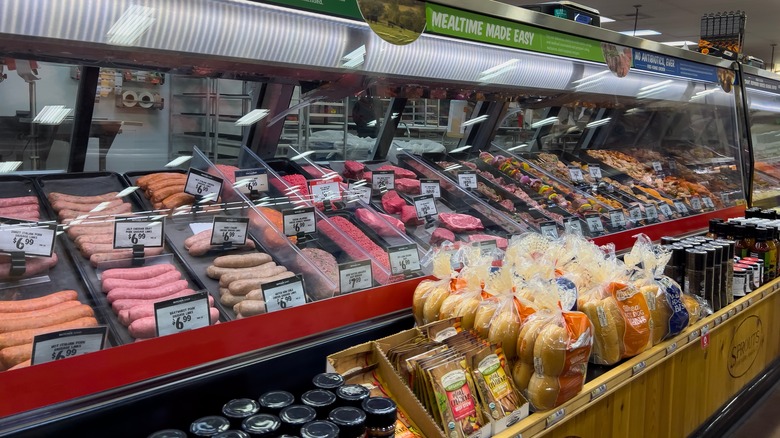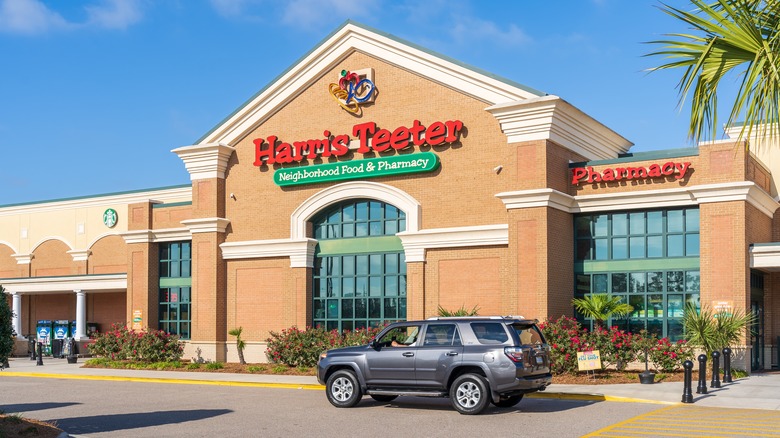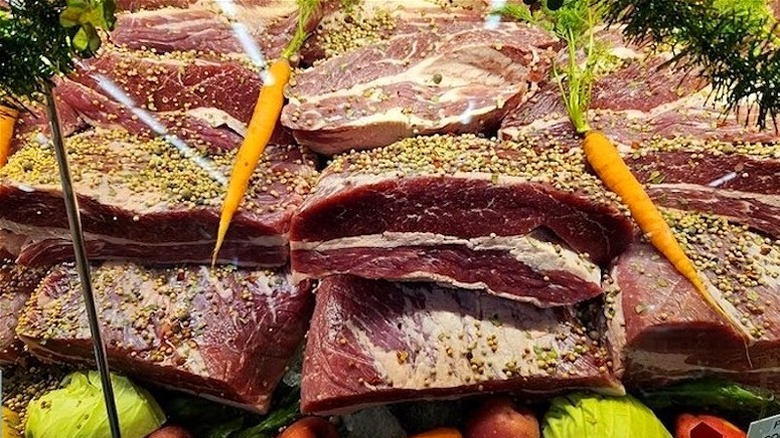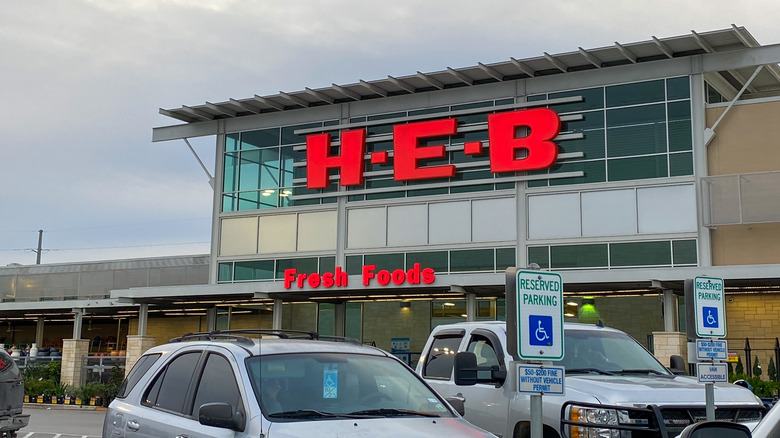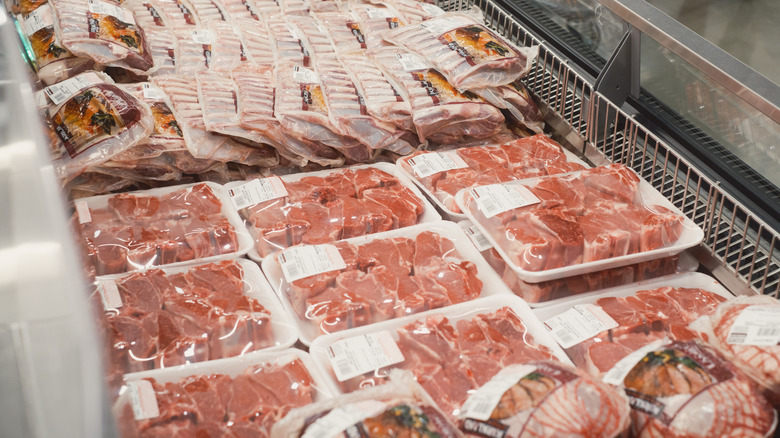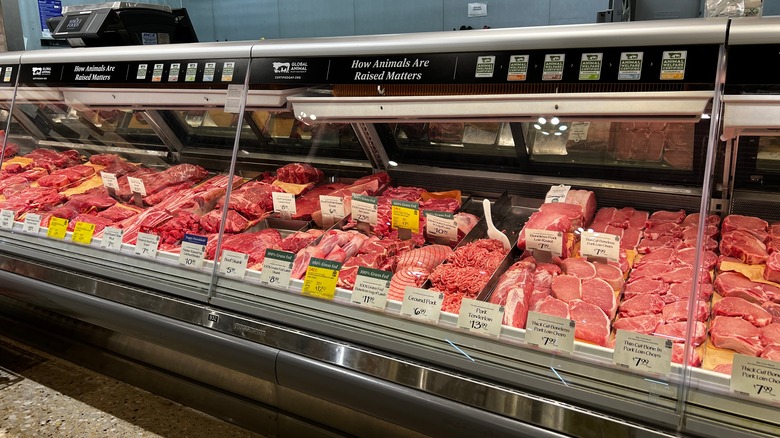Ranking The Best Grocery Store Butcher Shops
Meat has been a quintessentially American food since the country's founding. For centuries, Americans have demonstrated exceptional meat-eating habits that are fueled, in part, by meat production within the country. Accessibility to meat has remained. On average, 280 pounds of meat were available to American citizens per capita in 2020. By comparison, the United Kingdom had 175 pounds available per capita. Meat is so central to the United States' food culture. This was further demonstrated during the Coronavirus pandemic, when the government made meatpackers essential workers, despite the risks posed to these employees.
Even though American meat remains popular, American butchers still receive less attention. This is especially true in today's world, where most of us pick up our meat pre-packaged. When bought this way, there is little understanding or appreciation of the people who prepared it.
That being said, there are many American grocery stores that continue to offer an in-house butcher shop. Here, you can ask for a certain cut, seek cooking guidance from an expert, or learn more about where the animal came from. Unfortunately, the ability of staff to answer these questions, along with the quality of meat available, varies widely from store to store.
12. Walmart
Walmart sits at the bottom of our list, for the simple fact that it has not employed meat cutters for over 20 years. The sudden removal of meat cutters from Walmart stores came in 2000, two weeks after meat cutters at a Walmart store in Texas voted to unionize. Meat cutters and butchers have not been reintroduced to stores since.
In place of meat cutters and butchers, Walmart employs meat department sales associates. These individuals do not have butchering skills and rarely work with raw meat, as one supposed Walmart sales associate highlighted on Reddit: "We don't cut the meat at all. We get them prepackaged and sealed. All we do is put the use by labels on them. The only time we come in contact with raw meat is when we are doing throwaways."
To compound matters, meat is not a product that Walmart has a good reputation for. Not only has the company had to recall products in the past over health concerns, but the grocery store brand has also been linked to suppliers that liberally use antibiotics. As such, we would suggest going to other grocery stores where skilled members of staff handle high-quality meat.
11. Safeway
Safeway sells a range of fresh meat that is cut by a team of in-store butchers. Some consumers report that these butchers are knowledgeable and able to provide the custom cuts asked of them. Unfortunately, Safeway's butcher shop does not offer high-quality meat. A report from Consumers' Checkbook rated Safeway amongst the lowest grocery stores when it came to meat quality.
Like other grocery stores near the bottom of our list, Safeway has endured its fair share of alarming, meat-related news headlines. These have included the use of a meat filler known as pink slime in its products and, more recently, misleading promotional offers designed to sell meat.
Safeway has made some positive strides when it comes to its meat department. Animal welfare practices have been drastically improved by enhancing the living conditions of the pigs reared for slaughter and only sourcing chickens that have been humanely slaughtered. Hopefully, the focus on improved animal welfare will translate into better quality meat hitting Safeway's butcher shop shelves in the near future.
10. Sam's Club
The butcher shops at Sam's Club stores are staffed by helpful butchers and meat cutters. These staff members can usually cut meat to a customer's specific needs, according to one Reddit user who claimed to be a Sam's Club employee: "We can cut meat to your specifications as long as it's not anything too crazy. We can cut it to whatever thickness you want, give you a roast or a steak, trim it how you want .. nothing too crazy. If we can still sell it in our counter we are allowed to do it for you."
The quality of meat varies from brand to brand at Sam's Club. To get the best stuff, pick meat from the store's impressive range of prime and select beef. These are the two highest grades of meat certified by the U.S. Department of Agriculture. Both express good flavor and tenderness, based on their amount of intramuscular fat.
Sam's Club buys its pork from major meat suppliers such as Tyson. This Member's Mark brand pork is always free from hormones, preservatives, and steroids. The higher-end Smithfield brand (that's also sold at Sam's Club) uses pigs with unique, proprietary genetics that result in meat with more flavor. The chain's meat isn't so sustainable at the moment, but it has plans to improve in this department.
9. Wegmans
Wegmans is a much-loved grocery store with sites predominantly situated in the Northeast. The brand has a loyal consumer base, thanks to its wide range of quality products, including a popular self-branded line. The breadth of Wegmans' products is best highlighted in the store's meat department, where multiple tiers of each cut of steak — such as choice, antibiotic-free, and organic – are all available.
The vast majority of Wegmans meat products are raised without hormones or antibiotics and are not fed animal by-products. Some animals are even sourced from the local area. This quality is complemented by an impressive variety of products. Lesser known parts of the animal are often available to purchase, including items like marrow bones. As such, many home cooks visit Wegmans when seeking special cuts.
A drawback of Wegmans butcher shop is an apparent lack of engaged staff. One customer highlighted this on Reddit: "I find their deli and meat sections to be lacking, and I agree that a lot of the Wegmans brand items are pretty meh. They never seem to have a proper butcher at the meat counter and just tell me to grab things from the fridges."
8. Kroger
Kroger sells its meat via several different brands, including Kroger, Private Selection, and Simple Truth. Of these, Simple Truth is the most desirable brand. Its beef is often grass-fed. No hormones or antibiotics are used on the cattle and the beef is USDA organic.
The store's pork is less ethically sourced. The grocery store still sells pork that has been reared in gestation crates — cages that are so small pigs cannot turn around. Kroger has pledged to completely stop sourcing pigs kept in these conditions by 2025. Until this time, the brand continues to support this inhumane practice.
The majority of meat is shipped to supermarkets in large pieces that are then broken down by Kroger's butchers. This was explained by a self-proclaimed Kroger butcher on Reddit: "Kroger has actual butchers. We simply get hunks of meat, and then we cut it accordingly. We'll have a whole side of a cow and then cut it into certain steaks, roasts, etc. and use some of it for ground beef. The only things that are pre-cut are the pre-packaged items." The evident skill these butchers and meat cutters possess means they should be able to cut pieces of meat to order easily.
7. Meijer
In 2012, Meijer — a midwestern grocery store brand — announced it was transforming its meat departments into butcher stores. This move involved the hiring of three or four meat cutters per store. Meijer even committed to upgrading the quality of its products by stocking certified Angus beef.
Jerry Suter, who was Meijer's vice president of fresh merchandise at the time, highlighted this change to PR Newswire: "By making our meat department more like a traditional butcher shop, we are ensuring the best service for our customers. We are exclusively offering Certified Angus Beef, the absolute highest quality beef, and continuing that tradition of carrying the best brands without the premium prices ... Our team members in the Meijer meat department will now be able to provide even higher levels of customer service."
Another appeal of Meijer's meat products is the brand's commitment to selling beef that has been reared within 250 miles of the company's facilities. This means most Meijer stores, no matter where they are located, are selling local beef. Unfortunately, the emphasis on selling local meat does not extend to pork or chicken.
6. Sprouts Farmers Market
Sprouts Farmers Market is a grocery store brand that takes care of its meat sourcing. All pigs and chickens raised for slaughter are not treated with antibiotics. Some of its cattle are organic-certified and grass-fed. All of the store's grass-fed beef comes from American farms.
The meat from all these animals is handled by Sprouts' in-house butchers. Aside from butchering meat and cutting it to order, these staff members craft other products from scratch, including items like sausages. The butchers are also adept at answering queries, providing recommendations, and even offering cooking tips.
This helpfulness may stem from the butcher's jovial working environment. An aspect of the business highlighted by one of Sprout's ex-butchers on Indeed: "Work was pretty busy, I cut and prepped meats for both gourmet and service counters, made sure the department was always clean. I really enjoyed the people I worked with, the customers and my co-workers alike were all very kind people."
5. Harris Teeter
Harris Teeter is another regional American grocery store brand. The store stocks USDA choice Angus beef among other premium options including American Wagyu. This high-quality meat is backed up by exceptional service with in-house butchers being able to trim products or cut them to order as customers require.
Not content with just providing in-store support, Harris Teeter has even produced a range of helpful videos titled "Ask Your Butcher," which are posted on the chain's website. In this series of videos, Harris Teeter butchers answer questions on topics like how to cook a standing rib roast or what seasonings to use. Such easily accessible information is incredibly useful for all consumers, especially those that may have forgotten to ask questions in-store. It also demonstrates how well-informed the butchers at Harris Teeter are.
As with other brands on this list, Harris Teeter takes several steps to ensure its animal welfare policies are up to scratch. Pigs are not reared in gestation crates and all cattle suppliers are audited by the North American Meat Institute's animal welfare audit system.
4. Lunardi's Markets
All of the beef used at Lunardi's is USDA choice, meaning it is of high quality and contains a fair amount of marbling. The grocery store brand ages this meat on-site. All meats including beef, pork, and lamb are cut daily by Lunardi's butchers. Various stuffed roasts and other items are also prepared by this team of skilled employees.
Lunardi's butcher's fine work has not gone unnoticed, as this review on Tripadvisor highlights: "Lunardis is a very fine market. Prices may be a little higher, but the quality is excellent. They have a great meat department with lots of butchers ... Always fresh and a great variety."
All of Lunardi's stores are located in and around San Francisco. The brand has capitalized on the area's natural bounty by forging strong bonds with some of the region's best suppliers. One such supplier is Superior Farms, an employee-owned lamb producer that raises flocks outdoors on bio-dynamic fields. The meat produced by these animals and stocked by Lunardi's is exceptionally flavorful.
3. H-E-B
Meat cutters at H-E-B, a grocery store chain based in Texas, must pass a certification test before they become a fully-fledged member of staff. Practical skills form the basis of this test, ensuring that all H-E-B meat cutters can handle any request thrown their way.
The ability to explain different cuts, as well as give advice, are also key aspects of being a grocery store meat cutter. The staff at H-E-B pride themselves on being able to guide customers through the butcher shop counter. The brand even offers information on how to cook popular cuts online.
As H-E-B is based in Texas, the brand has no shortage of local beef suppliers. As such, the brand only takes meat from the very best. John Sauter, H‑E‑B meat procurement director, explained the importance of these local ranches to his employer: "We are the largest seller of Texas beef because we are dedicated to local ranchers and partnerships. Being closer to our ranchers and partners means that we can closely monitor animal welfare and quality while providing the freshest beef at the lowest prices and giving back together to our Texas communities. We still cut fresh meat in every one of our stores and have more than 1,800 highly skilled meat cutters ready to custom‑cut whatever our customers want, at any given time."
2. Costco
Costco's butcher shop has a fantastic reputation amongst food lovers, cooks, and those in the meat industry. This is because the brand stocks high-quality meat, including both USDA prime and choice beef, that is processed by a team of exceptional meat cutters and butchers.
The reputation the butcher shop has drives an incredible demand for freshly cut meat at all Costco locations. This high-octane working environment ensures only the best meat cutters work at the brand, as one so-called Costco employee explained on Reddit: "It's not uncommon for someone [a new meat cutter] to come to Costco and immediately realize they're in over their head. That's one reason why Costco would rather train internally than hire from the outside. Costco also has very specific trim specs for meat that probably won't be the same as a previous employer. My last Costco's Meat department averaged about $150k a week in sales and holiday weeks topped $250k, many are busier than that. Less than a third of that is from prepackaged meat like chicken, seafood, and cryovacs. Everything else is cut."
The main reason why Costco's butcher shop didn't top our list was because of the quantities that the meat must be bought in. Buying in bulk may not be an issue for some, but many people cannot justify buying huge items like a six-pound whole beef filet. Having to store so much meat can also be a major inconvenience.
1. Whole Foods Market
At the top of our list is Whole Foods Market. The international grocery store chain has gained acclaim for selling high-quality, healthy food and this reputation is enhanced by the brand's current butcher shop. By only buying meat that meets the company's high standards, Whole Foods ensures a consistency in its meat products that other stores struggle to attain.
All meat products are handled and processed by butchers that believe in handcrafted products. This approach was explained by Michael Whittemore, Meat and Seafood Category Merchant at Whole Foods Market, to Retail Times: "We are traditional in the way we do things here, anyone visiting our meat and seafood counters can testify to that. We are true believers in maintaining the artisan craftsmanship that the trade deserves. We make our own sausages, burgers, and other value-added products in house to ensure the quality and consistency of product is the best it can be. Meat and seafood are at the heart of our fresh offer; we offer best in class customer service with all our team members having the core key skills and knowledge enabling them to pass this on to our customers." Whole Foods Market is also committed to training its staff.
Unlike Costco, Whole Foods allows customers to buy meat in any quantity they want. This fact makes Whole Foods' butcher shop the best grocery store offering in the country.
